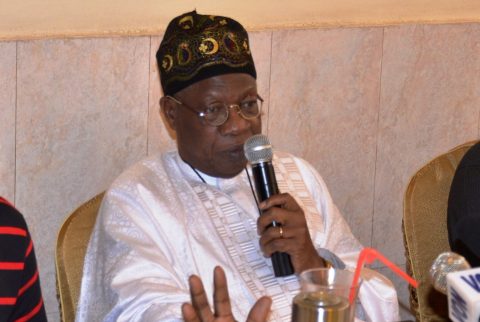Ikra Aliyu Bilbis, chairman of National Broadcasting Commission (NBC) board, says Lai Mohammed, minister of information and culture, amended the country’s broadcasting code “unilaterally”.
The controversial amended code was launched in Lagos on August 4 despite opposition by stakeholders in the industry.
One of the amendments to the code is the increase of hate speech fine from N500,000 to N5 million and the provision for sub-licensing of all broadcast contents among others.
In June, Armstrong Idachaba, NBC acting director-general (DG), disowned a call for position papers by the board of the commission on the amendments.
Addressing a press conference in Abuja on Thursday, Bilbis said he received over 50 position papers for the sixth amendment of the code but none of the input was considered.
“Code review is undertaken every four years and involves the staff of the NBC, former DGs, retired directors of the Commission and all other relevant stakeholders in broadcasting. These include Broadcasting Organisations of Nigeria (BON), Independent Broadcast Association of Nigeria (IBAN), private media outfits, broadcasters, notable media intellectuals, communication experts, digiteam and the academia,” he said.
“The current edition (6th Edition) was presented to the public in 2019 at an elaborate ceremony in Kano which attracted a broad section of various stakeholders.
“Following the 2019 national elections, some members of the Federal Executive Council (FEC) made observations to the Minister of Information at a FEC meeting about the divisive broadcasts engaged in by some broadcast media before, during and after the elections and the need to strengthen the operations of the NBC to avert such future occurrence,” the chairman said.
“This noble observation of Mr President was unfortunately misunderstood by the Honourable Minister of Information.
“Instead of studying and following the law, relevant rules and regulations, and direct the appropriate authorities as stipulated by the law to act on, he erroneously embarked on the review alone.
“As a board, we have received and taken our time to compile the responses of numerous stakeholders which include our Nobel Laureate, activists, legal practitioners, broadcasters, investors, BON, content creators, copyright experts and professional organisations. Most of them have adduced reasonable reasons against the proposed amendment.
“The NBC was set up by law and there is an Act that guides its operations. The Honourable Minister therefore cannot usurp the powers of the board as clearly stated in the Act. Any such action by the Minister is illegal.
“The board of the NBC wishes to make it quite clear that as long as it is in place, the only NB Code that we recognise and which we shall work with in the setting of operating policies and standards for the NBC is the 6th edition of the NB code which was launched in 2019 in Kano.”
Bilbis said the board was not informed of the launch and that out of 60 stakeholders, the minister picked only four to be present.
“You may all recall that by 26th March, 2020, (the day of the ‘Public Presentation’ in Lagos), the federal government had already announced a COVID-19 lockdown of Lagos, Ogun states and the FCT,” he said.
“It was, therefore, not a sincere effort to present such an important ‘review document’ which affects people’s investments and livelihoods under such a situation.”
The board chairman explained that the amendment will destroy investments and lead to job losses, adding that the minister has failed to show the approval of “his own version” by President Muhammadu Buhari.
“The danger of allowing the unilateral amendment of the NB Code to stand is that investors in the industry will lose confidence in the stability the broadcast ecosystem has enjoyed till date before the advent of the current Minister of Information,” Bilbis said.
“Our President and his team have worked so hard to galvanise local and foreign investment in Nigeria. Allowing obnoxious policies to take root in our investment culture will spell doom for creativity, enterprise, diversity and the general development of broadcasting in Nigeria.”
The NBC is made up of a board of commissioners appointed by the president as a policy-making body.
The DG of the commission is a member of the board who oversees the day-to-day running of the organisation.


